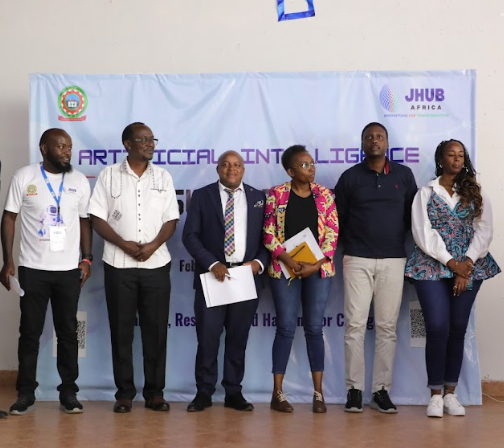Kenya, often referred to as the “Silicon Savannah” due to its thriving tech sector, is making significant strides in Artificial Intelligence (AI), with growing adoption across industries and institutions.
AI is increasingly becoming part of everyday life in Kenya, serving as a tool for information gathering, research, and even economic opportunities. Some advanced AI systems generate artwork that street vendors print, frame, and sell, while major companies like Safaricom have integrated AI into their operations, including the development of chatbots like ‘Zuri.’
Learning institutions are also embracing AI, with Jomo Kenyatta University of Agriculture and Technology (JKUAT) leading the way through its digital innovation hub, JHub. The hub provides young innovators with a platform to develop AI-driven solutions for real-world challenges and turn their ideas into viable businesses.
“I noticed a gap among students at JKUAT. They had innovative ideas but lacked an outlet to bring them to life. JHub was established to bridge this gap, helping students transform their concepts into businesses and projects that benefit society,” said Dr. Lawrence Nderu, Chairman of JKUAT’s Department of Computing, Founder of JHub Africa, and Co-Founder of the Green Digital Innovation Hub (gDIH).
JHub currently has 32 ongoing projects across various sectors, including agriculture, health, and education, with most initiated in April last year. The hub aims to complete at least 15 of these projects by the end of 2026.
“Startups are not easy, but we are not afraid of failure because it is part of the learning process,” added Dr. Nderu.
JHub collaborates with several institutions and organizations, including Microsoft, THiNK, United States International University (USIU), Dedan Kimathi University of Technology (DKUT), AI Kenya, and Nexford University.
It welcomes innovators from within and outside JKUAT, including students from other universities and members of the surrounding community. The hub accommodates individuals from diverse faculties beyond computing, such as engineering and food science, with the goal of supporting anyone with an idea and a desire to develop it.
In a bid to promote AI awareness and innovation, JHub hosted its first summit from February 10 to 14, bringing together researchers, innovators, students, and industry experts to explore AI trends, foster innovation, and build practical AI skills.
During the summit, various AI-driven solutions were presented, aimed at addressing real-world challenges. Speaking at the event, North Horr Member of Parliament Mr Wario Adhe emphasized the need for homegrown AI solutions.
“We have our own unique problems as Africans. I have visited European organizations and tried to explain concepts such as pastoralist schools—mobile schools—but they struggle to understand. How can a young person in Silicon Valley solve our problems when they do not know what challenges we face? Leading the AI revolution is a Pan-African dream and a core part of Africa’s Renaissance,” he said.
According to the United Nations Development Programme (UNDP), AI could boost Africa’s economy by approximately $1.2 trillion by 2030, representing a 5.6% increase in GDP. However, experts argue that achieving this potential will require deliberate and strategic investment in talent, infrastructure, and policies that foster innovation.
For Kenya, AI presents an opportunity not just for technological advancement but also for building successful enterprises that address local challenges while competing on a global scale.
By Yvonne Wangeci





